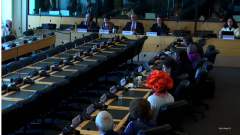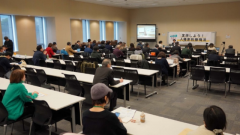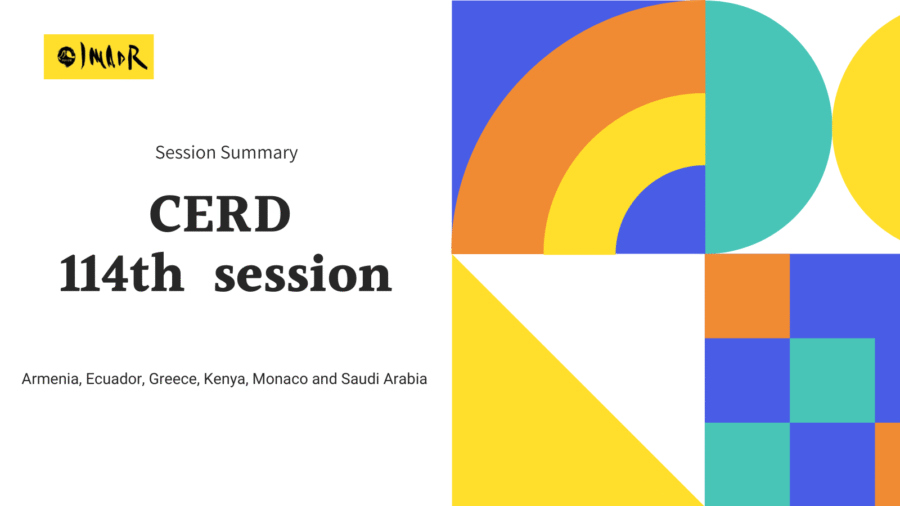TB-Net Statement: 33rd Meeting of Chairpersons of the Human Rights Treaty Bodies (2021)
June 7, 2021
TB-Net Statement
33rd Meeting of Chairpersons of the Human Rights Treaty Bodies
7-11 June 2021
- Introduction
This is a joint statement on behalf of seven organisations, which form TB-Net (NGO Network on UN Treaty Bodies)[1]. Created in February 2017, TB-Net is an informal group of international NGOs and networks who work closely with seven of the UN treaty bodies (CERD, CCPR, CESCR, CEDAW, CAT, CRC, CRPD) and have specialised expertise on their procedures and substantive work. Our mission is to support and enhance the effectiveness of the UN treaty bodies (UNTBs) so that they can better contribute to the realisation of the human rights of all persons.
- Civil society participation
We very much appreciate the opportunity to interact with the Chairs today. TB-Net has been regularly engaging in Chairpersons’ meetings to bring the perspective of a variety of civil society organisations (CSOs) into the Chairs’ discussions. However, we wish to highlight the challenges in ensuring wider civil society participation in the meetings, due to the lack of predictability of the programme and modalities. We would welcome standard guidelines on civil society participation in the Chairpersons’ meetings, including concrete indications of how such participation contributes to the objectives of the meeting. TB-Net will use such guidelines to promote more inclusive and diverse participation that would certainly benefit the Chairs’ discussions.
- Focused reviews
TB-Net welcomes the decision to continue the discussion at the 33rd meeting on the strengthening of the treaty body system and the recommendations contained in the report of the co-facilitators[2], as well as on the alignment of working methods, practices and tools of the UNTBs where appropriate, including in the context of the COVID-19 pandemic.[3]
We appreciate steps taken by some Committees to develop and adopt fixed calendars for their State party reviews. We believe that a fixed calendar will provide predictability, which strengthens the effectiveness of the UNTB system and is a significant benefit to all stakeholders in navigating it. The current situation highlights the urgent need for such calendars, as disruption caused by the pandemic is adding challenges in the unpredictability of reviews, potentially further delaying reporting by States parties and the backlog of processing State party reports. We encourage the UNTBs to adopt a fixed and coordinated calendar for reviews by all Committees. In this regard, we would like to recall the joint civil society proposals[4] made in 2019 and provide additional elements for consideration.
Prior to the co-facilitation process on the 2020 review of the treaty body system, TB-Net led a series of consultations with CSOs from the national, regional and international levels to develop joint proposals. The proposals were prepared in accordance with five overarching principles: human rights protection as the ultimate aim; specificity within one system; adequate funding for the system’s effective functioning; civil society participation as a vital part of the system; and the independence of the UNTBs.
The proposals offer a model based on an 8-year overall cycle, in which all States parties engage with UNTBs every 4 years, to ensure regular reporting and dialogue between the Committees and States, through an alternating, two-level cycle of comprehensive and focused reviews. The UNTBs would review each State party on a regular basis according to a fixed and coordinated calendar, regardless of whether States parties have submitted their reports. The comprehensive reviews would take place every 8 years for 6 hours in Geneva, and address all the provisions of the respective treaties. The focused reviews would take place 4 years later, focusing on assessing the progress made on the most pressing issues identified in the comprehensive review, as well as any new or urgent issues that have arisen.
As we understand that the Chairpersons are discussing possible modalities of the focused review, we would like to highlight that:
- It is important that the focused review is an official activity of the UNTBs accompanied with the necessary resources.
- The focused review should be a moment of effective interaction between the UNTBs and States. Therefore, it should not be a simple desk review similar to the existing follow-up reviews or a fully online dialogue similar to those held during the pandemic. While the experience of the first online dialogues has been positive overall, the technical limitations have confirmed that this practice should remain a temporary and exceptional measure, with virtual participation complementing in-person reviews in a manner that enhances access for States parties and civil society.
- The outcome of the focused review should be recommendations adopted by the whole Committee, even if the interaction happens with a limited number of members. To ensure quality and balance (regional, expertise, gender), the interaction should involve more than 1 member, ideally the country rapporteurs or country task force.
- Priority for the location of the focused review should be given to the national level to allow the UNTBs to engage with more stakeholders, both from the State and civil society, which would help Committee members to gain an in-depth understanding of the human rights situation on the ground. However, flexibility needs to be factored in to address situations in which a State refuses an in-country focused review or when such a review is not feasible for external factors. In such cases, priority should be given to a focused review through a 3 hours dialogue in UN regional headquarters to encourage wider outreach to and engagement from stakeholders from the national level. In all locations, CSOs should be able to choose the format of their engagement with the focused review, in-person or online, to ensure inclusivity and accessibility.
- Secure and enhanced civil society participation should be at the core of the focus review to ensure that their inputs inform the review and its outcome in a safe and meaningful manner.
In order to test modalities of the proposed focus reviews, TB-Net and the Geneva Academy for Human Rights and Humanitarian Law will pilot focused reviews with States in 2021, in cooperation with the Office of the UN High Commissioner for Human Rights (OHCHR). We call on the UNTBs to use this pilot project as an opportunity to explore and analyse the practical implications of focused reviews, essential for the development of an effective methodology that takes civil society participation into account. We strongly encourage the UNTBs to ensure that outcomes of the pilot project are fully reflected in their decision-making process concerning the focused review.
- Backlog of State party reports
We reiterate our appreciation of efforts undertaken by the UNTBs, OHCHR and the United Nations Office at Geneva (UNOG) to continue the work of the UNTBs, despite the technical and logistical challenges posed by the pandemic. We particularly welcome the fact that all UNTBs have now piloted online reviews of States parties in which CSOs have been provided with opportunities to engage with respective Committees. We urge all UNTBs to continue undertaking virtual reviews as the effective interim method to close the protection gap in the current absence of in-person reviews.
At the same time, we are increasingly concerned by the growing backlog of State party reports awaiting consideration due to the limitation on the number of online reviews that the UNTBs can undertake during one session for technical and logistical reasons. Taking into account the ongoing developments in the public health situation in Switzerland and the rest of the world, we believe that it is necessary for both the UNTBs and the OHCHR to identify next steps towards undertaking in-person reviews in the near future. It is critical to prevent further backlogs of State party reports and delay in other activities of the UNTBs. It is encouraging that some UNTBs have already started considering the possibility of resuming in-person meetings, at least in a hybrid manner.[5] We urge the UNTBs and the OHCHR to examine options for the resumption of in-person meetings for autumn sessions of 2021.
Further in this regard, TB-Net recommends that when decisions are taken in relation to modalities of future sessions, the UNTBs ensure that:
- There is full, meaningful and safe civil society engagement, with flexibility and inclusivity;
- Decisions are immediately and widely communicated; and
- Information on any modification of future sessions is shared in a timely manner to allow transparency and predictability of the process.
[1] Centre for Civil and Political Rights (CCPR-Centre), Child Rights Connect, Global Initiative for Economic, Social and Cultural Rights (GI-ESCR), International Disability Alliance (IDA), International Movement Against All Forms of Discrimination and Racism (IMADR), International Women’s Rights Action Watch Asia Pacific (IWRAW-Asia Pacific) and World Organisation Against Torture (OMCT)
[2] A/75/601
[3] HRI/MC/2021/1
[4] http://ccprcentre.org/files/media/joint_ngo_proposal_on_untb_reviews.pdf
[5] https://www.ohchr.org/EN/NewsEvents/Pages/DisplayNews.aspx?NewsID=27047&LangID=E
Download the statement![]()





